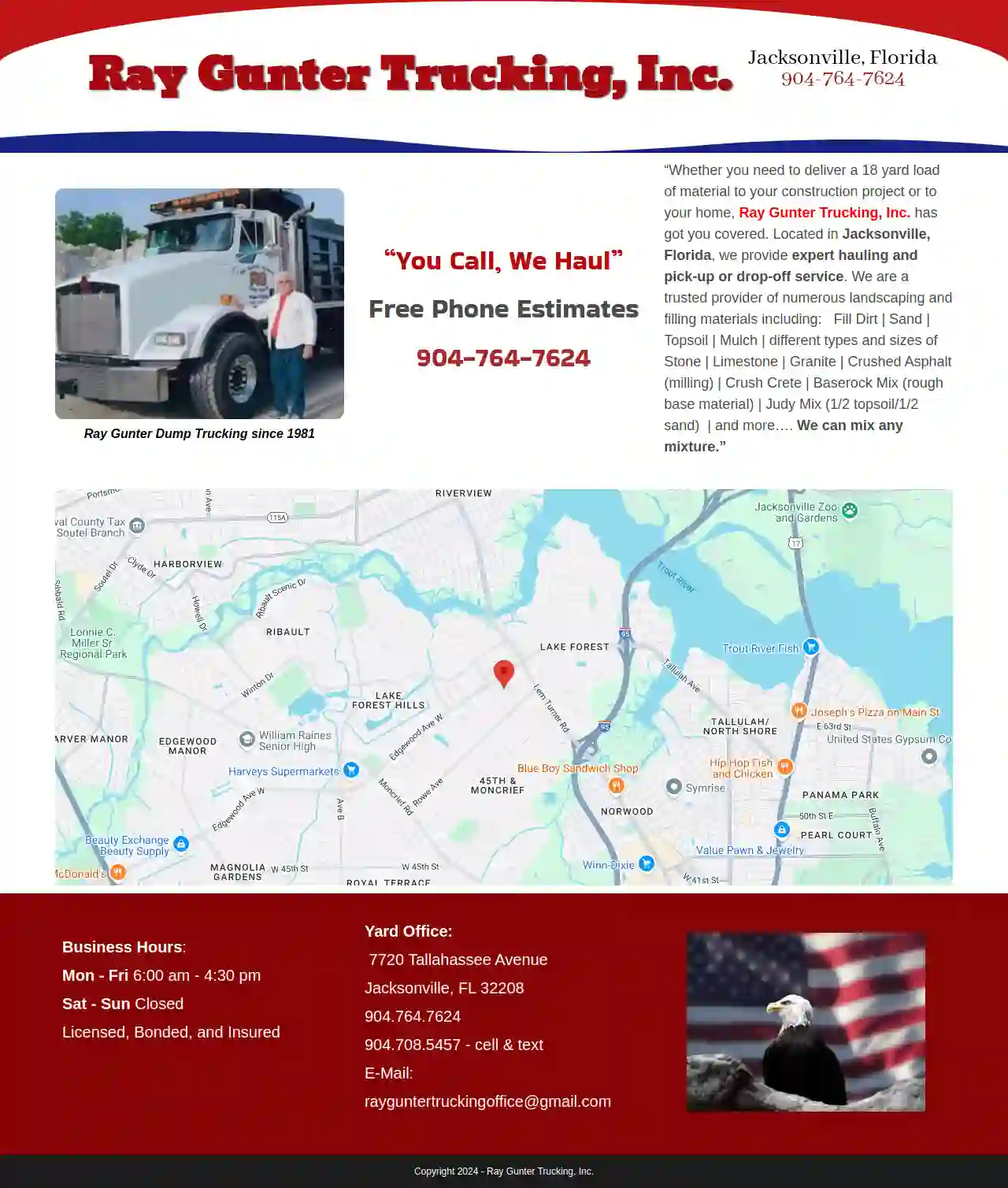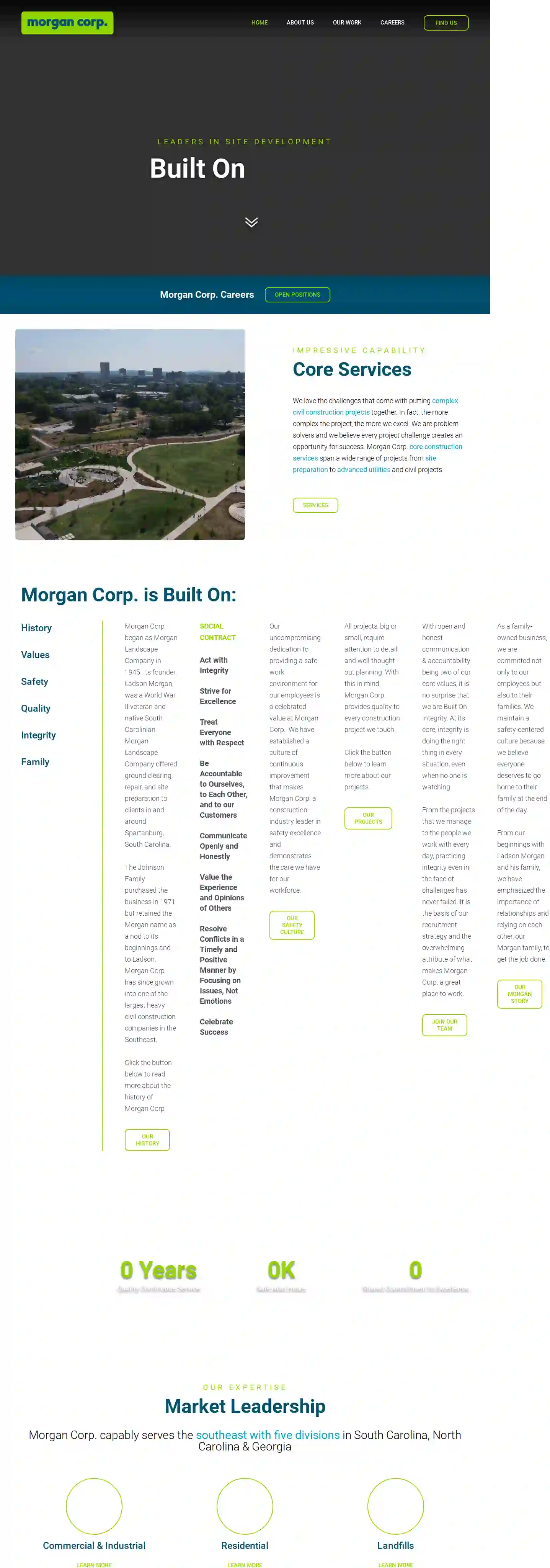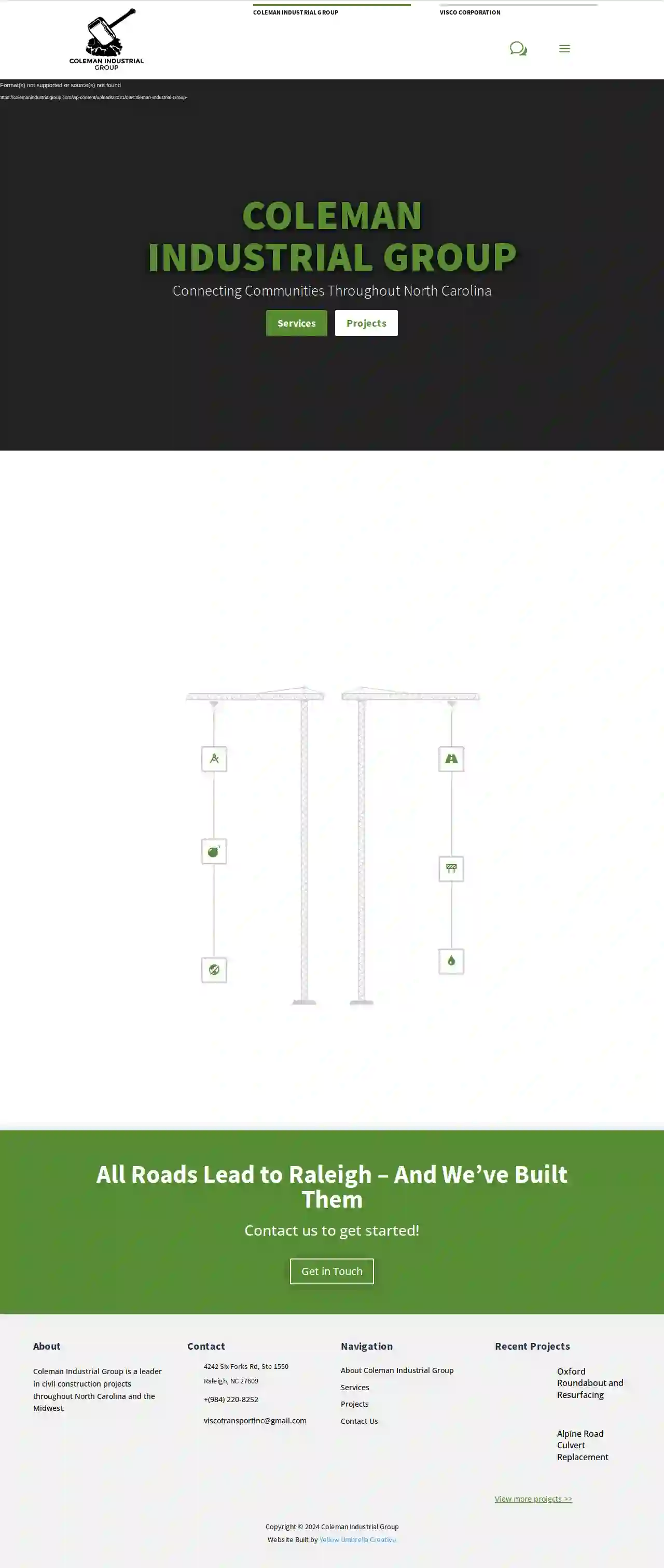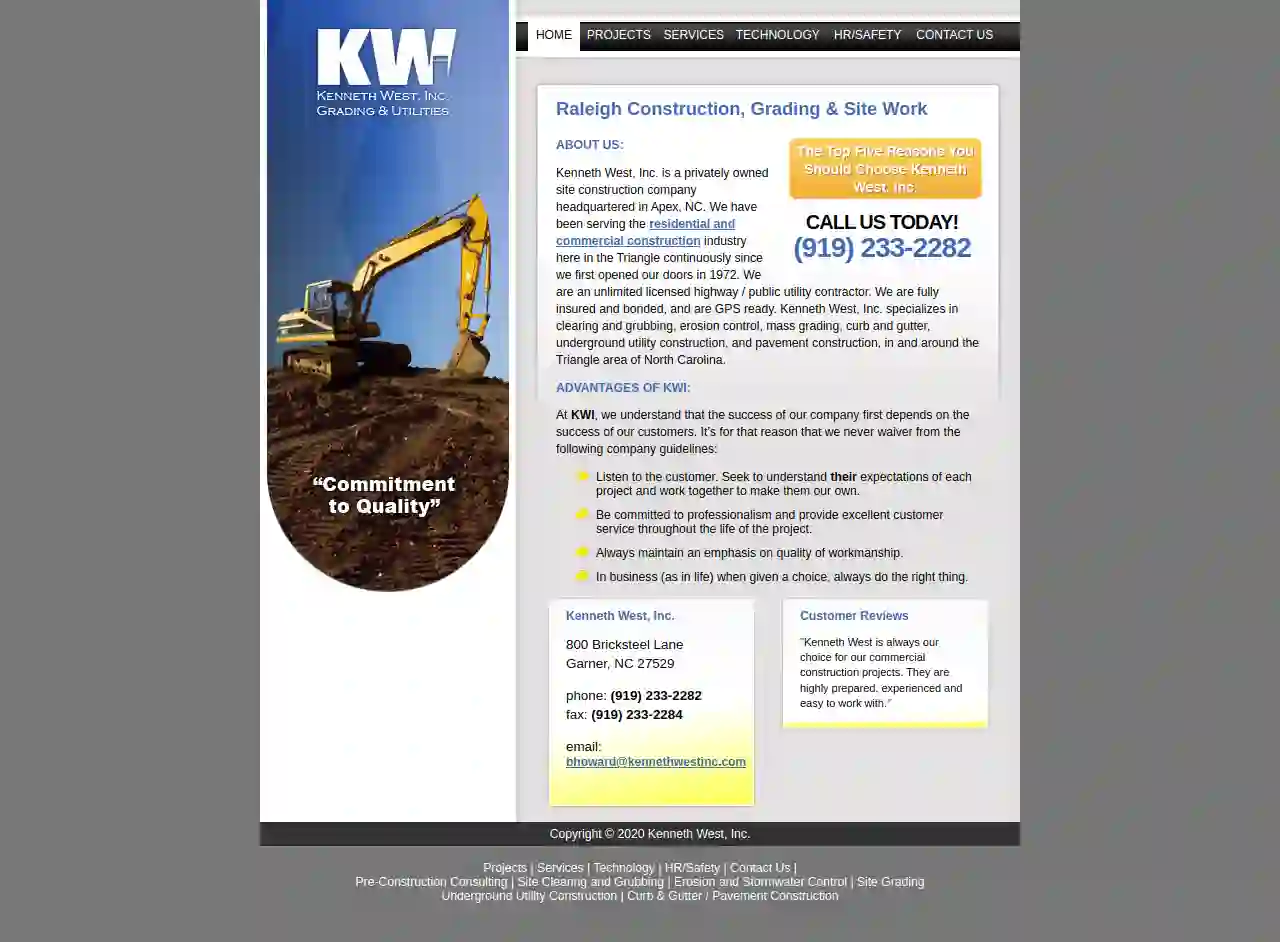Excavation Contractors Fuquay-Varina
Best Excavation Company Near Me in Fuquay-Varina
Get multiple Excavating Contractors quotes for your project today! Compare profiles, reviews, accreditations, portfolio, etc... and choose the best offer.

AQUALIS Formerly Weeks Utility Services, Inc.
3.115 reviewsJacksonville, USAQUALIS is the nation's leading provider of sustainable water management for stormwater, wastewater and water quality testing. Our Professional Engineers and certified water compliance professionals provide technical expertise and optimal, tailored solutions for sustainable water compliance, design, consultation, construction and management. From concept to completion and lifetime preventative maintenance and repairs, AQUALIS has the in-house capabilities to support your corporate water infrastructure and compliance needs.
- Services
- Why Us?
- Gallery
Get Quote
Raleigh Waterproofing Inc
4.830 reviewsRaleigh, USWelcome To Raleigh Waterproofing Raleigh Waterproofing Inc. was established in May 2001 by David Hawkins II to provide quality service, expert support and knowledge to everyone. There is nothing more important than the customer’s complete satisfaction! We excel in both residential and commercial waterproofing and repairs. We have built our reputation on honest advice, quality service and continued customer support. Our motto has always been, “You haven’t seen expensive until you hire an amateur”. WHO WE ARE We provide you with services you need at prices you can afford. You deserve the best waterproofing services, and Raleigh Waterproofing is dedicated to providing you those services! OUR MISSION To treat each project as special, and worthy of our best work. We will assist you with each phase of your project in a professional and courteous manner. OUR VISION To become the benchmark for quality new construction and commercial waterproofing work. Through continuous improvements in integrity, teamwork, and creativity of our people.
- Services
- Why Us?
- Gallery
Get Quote
Netfloor USA Cable Management Access Floor Systems
52 reviews374 Crompton St, Suite B, Charlotte, 28273, USAbout us Netfloor USA is a full-service design, manufacturing, sales, and installation company for a wide range of raised access floors. We create beautiful, functional raised access floors that simplify operations while looking fantastic. Our mission is to integrate data and power infrastructure in your building. Our Mission We believe that a floor is more than a walking surface. An access floor is a three-dimensional, living, breathing part of your building that can simplify operations while looking fantastic. Our mission is to integrate data and power infrastructure in your building. Our mission is to revitalize the building industry, IT and cabling industry by providing innovative, useful products with outstanding customer support. Our Capabilities From 1.5" high low-profile cable management floors to access floors of 4 feet and higher, our staff performs site evaluations, CAD design, installation, and service. We work in all industries: commercial, mission critical, institutional, retail, healthcare, and more. Our Support While we believe in our products 100%, the real magic is in our support. We work with you and your team every step of the way, from concept and design to installation and support after the sale. We think the floor you walk on, the floor you build your displays on, and you run your cables in is the most important part of your building, and we're committed to your success! Netfloor USA is a MonMan brand. Netfloor USA Meets the Buy American Act, and has years of project experience with the U.S. Government, U.S. Military as well as State and Local Government projects.
- Services
- Why Us?
- Testimonials
- Gallery
Get Quote
J.B. Coxwell Contracting, Inc.
440 reviewsJacksonville, USWho We Are J.B. Coxwell Contracting was established in 1983. Initially, the company focused on land clearing and earthwork but quickly expanded its operations to include complete site development, including underground utilities, as well as heavy highway and civil construction in the public and private sectors, becoming one of Florida’s most well respected construction companies. Our Principals Exceed Community and Client Expectations Utilize Advanced Technologies in Data Gathering and Equipment Provide the Safest Possible Work Environment for All Employees Focus on Sustainability Efforts in Every Aspect of our Work Access our Complete Line of Bonding on all Projects to Reduce Client Costs Deliver the Highest Quality Work on Every Project The J.B. Coxwell Legacy Our founder, J.B. Coxwell, took out a second mortgage on his home to start this company. Through hard work, commitment, and loyalty to those who helped him reach his goals, he built a diverse business that provides employment and income for hundreds of local families. His belief in utilizing whatever resources are necessary to complete a project on time remains a leadership commitment and his example of treating every person he met with dignity and fairness is a cornerstone of our company. JB’s presence is continually felt throughout the business and we honor his legacy by living his core values of honesty, loyalty and integrity in every task we undertake. Company Culture At J.B. Coxwell we strive to provide benefits for our employees in and out of work. We value every employee, appreciating their contribution to the success of our business. As a part of this value, we offer opportunities to grow within the company as well as a variety of resources that support personal and professional success. Our business is growing and expanding daily and we seek committed, hardworking people to fill a variety of positions. If you would like to join the J.B. Coxwell employee family, please complete this application.
- Services
- Why Us?
- Gallery
Get Quote
Choate Construction
3.86 reviewsRaleigh, USOur Expertise Choate is a leading construction company with a proven track record of delivering high-quality, innovative projects. We are committed to providing our clients with the best possible service and value. Our expertise spans a wide range of construction services, including: Our Culture At Choate, we believe in building more than just structures. We build communities, relationships, and people. We value what defines us beyond construction, and we are committed to creating a positive and rewarding work environment for our employees. About Us Choate is a privately held, employee-owned company with a rich history of success. We are committed to providing our clients with the highest quality construction services, and we are proud of our reputation for excellence. We are also committed to giving back to the communities we serve.
- Services
- Why Us?
- Gallery
Get Quote
Ray Gunter Dump Trucking
4.640 reviews7720 Tallahassee Avenue, Jacksonville, 32208, USRay Gunter Trucking, Inc. - Your Trusted Hauling Partner in Jacksonville, Florida Since 1981, Ray Gunter Trucking has been a reliable name in the Jacksonville area, providing expert hauling services for both residential and commercial projects. We understand the importance of timely and efficient delivery, ensuring your materials arrive on schedule and ready for your next project. Whether you're a homeowner tackling a landscaping project or a contractor managing a large construction site, we've got you covered. Our team is dedicated to providing exceptional service and delivering your materials with care. We offer a wide range of materials to meet your needs, including: Fill Dirt Sand Topsoil Mulch Various types and sizes of Stone Limestone Granite Crushed Asphalt (milling) Crush Crete Baserock Mix (rough base material) Judy Mix (1/2 topsoil/1/2 sand) And more… We're also happy to mix custom blends to meet your specific project requirements. Contact us today for a free phone estimate and let us help you get your project off to a smooth start.
- Services
- Why Us?
- Gallery
Get Quote
Morgan Corp.
4.77 reviewsRaleigh, USWho We Are Morgan Corp. is one of the largest heavy civil construction firms in the Southeast and has been working to earn that title for over 75 years. We take pride in the quality of our work and our employees, which go hand in hand. Morgan Corp. strongly believes that our success is thanks to our employees’ efforts and achievements. Morgan Corp. encourages continued learning, valuing the experience of others, and more. All of which pushes us to be the company that we are. We hope to appear great to outsiders, but truly it starts within. What Makes Us Great Morgan Corp. is built on a foundation of integrity, family, safety, and quality. These values are reflected in everything we do, from the way we treat our employees to the way we approach our projects. Our History Ladson Morgan started Morgan Landscaping in 1945. He established his name as one of quality and trust. When he passed his company to the Johnson family, they knew they had to upkeep his legacy. Now known as Morgan Corp., Ladson Morgan has expressed how proud he is that he can still be affiliated with our story – which our story starts with him.
- Services
- Why Us?
- Gallery
Get Quote
Coleman Industrial Group
4242 Six Forks Rd, Ste 1550, Raleigh, 27609, USColeman Industrial Group is a leader in civil construction projects throughout North Carolina and the Midwest. With over 50 years of collaborative partner experience, Coleman Industrial Group provides value-added quality civil construction services and innovative practices for roadway, highway, and bridge construction projects. From initial site surveying to earthwork and stormwater management, our team keeps the entire project process in mind from start to finish. Coleman Industrial Group performs training and development as well as routine maintenance, disaster debris removal, and work zone and traffic control for uncertain weather conditions. The focus is always to deliver exceptional work for communities, public agencies, and private corporations throughout the Midwest and Southeast. Services Coleman Industrial Group offers a wide range of civil construction services, including: Demolition and dismantling of buildings, structures, and appurtenances. This includes underground storage tank (UST) and pipe removal, disaster debris removal, and clearing and grubbing. Supplier of steel members used in transportation and highway safety, lighting, utilities, and bridges. Excavation, placement, and compaction of roadway materials, shoulder construction, and aggregate base course. Construction of stormwater utility pipe, culverts, box beam, and core slab bridges, stormwater vacuum maintenance, and water and sewer line installation. Pre-construction planning services that prepare the right-of way and proposed site for infrastructure development. Profile milling to restore surfaces, construction of pavement surfaces using hot mixed asphalt (HMA), and asphalt surface treatment (AST) maintenance.
- Services
- Why Us?
- Gallery
Get Quote
Arc Excavation INC
518 reviews15364 Yellow Bluff Rd, Jacksonville, 32226, USStart Your Project Right With My Dependable Excavation Service! Excavating land is a demanding task that requires experience and resources. If you lack either, you should consider hiring Arc Excavation INC. I offer a reliable excavation service to clients in Jacksonville, FL. If you have a project in the area, give me a call, and I'll ensure your project is executed flawlessly. Every excavation project is taken seriously I understand the importance of every excavation project, and I treat each one with the utmost care and attention to detail. Whether it's a small residential project or a large commercial undertaking, I'm committed to delivering exceptional results that meet your specific needs and exceed your expectations. Areas of Specialization I specialize in a wide range of excavation services, including: Underground Utility Services Excavation Grading Drainage Solutions Land Clearing Road Restoration Our Services I offer comprehensive underground utility locating services, ensuring your infrastructure projects are executed efficiently and safely. From laying pipelines to installing cables and conduits, my expertise covers all aspects of utility work. I use advanced technology and adhere to industry standards to guarantee the highest quality and precision.
- Services
- Why Us?
- Testimonials
- Gallery
Get Quote
Kenneth West Inc
45 reviews800 Bricksteel Lane, Garner, 27529, USAbout Us Kenneth West, Inc. is a privately owned site construction company headquartered in Apex, NC. We have been serving the residential and commercial construction industry here in the Triangle continuously since we first opened our doors in 1972. We are an unlimited licensed highway / public utility contractor. We are fully insured and bonded, and are GPS ready. Kenneth West, Inc. specializes in clearing and grubbing, erosion control, mass grading, curb and gutter, underground utility construction, and pavement construction, in and around the Triangle area of North Carolina. Advantages of KWI At KWI, we understand that the success of our company first depends on the success of our customers. It’s for that reason that we never waiver from the following company guidelines: Listen to the customer. Seek to understand their expectations of each project and work together to make them our own. Be committed to professionalism and provide excellent customer service throughout the life of the project. Always maintain an emphasis on quality of workmanship. In business (as in life) when given a choice, always do the right thing.
- Services
- Why Us?
- Testimonials
- Gallery
Get Quote
Over 22,076+ Excavation Businesses on our platform
Our excavation pros operate in Fuquay-Varina and surroundings!
ExcavationHQ has curated and vetted Top Excavation Companies near Fuquay-Varina. Find a top & reliable contractor today.
Frequently Asked Questions About Excavation Contractors
- Trench Collapses: Unstable trench walls can cave in, posing a severe risk to workers. Proper shoring and sloping are crucial safety measures.
- Utility Damage: Striking underground utilities (gas, water, electric) can cause leaks, explosions, or electrocution. Accurate utility locates and careful digging are essential.
- Falling Objects: Materials or equipment falling into excavations can injure workers. Securing work areas and using appropriate safety gear is vital.
- Equipment Accidents: Operating heavy machinery involves risks of rollovers, collisions, or mechanical failures. Trained operators and proper equipment maintenance are critical.
- Environmental Hazards: Excavated soil might contain hazardous materials (asbestos, lead). Proper testing and disposal procedures are necessary.
- Spring and Fall: Often considered favorable due to moderate temperatures and drier soil conditions.
- Summer: Can be suitable, but hot weather can make working conditions challenging and might require additional measures (shade, hydration) for workers.
- Winter: Excavation in winter can be more difficult due to frozen ground, snow, and potential delays caused by inclement weather. It might also require specialized equipment or techniques.
- Mechanical Excavation: Utilizing heavy equipment like excavators, backhoes, bulldozers, and loaders, suitable for most projects.
- Hand Excavation: Using hand tools (shovels, picks) for smaller excavations or delicate work near utilities.
- Blasting: Employing explosives to break up rock or hard materials, typically for large-scale projects.
- Hydro Excavation: Using high-pressure water jets to loosen and remove soil, often used for locating utilities or delicate excavation.
- Vacuum Excavation: Employing a vacuum system to suck up excavated material, suitable for safe excavation near utilities or in confined spaces.
- Utility Locates: Contact your utility companies to mark the locations of underground lines before excavation begins. This is usually a free service.
- Hand Digging: Excavate carefully by hand near marked utility lines to avoid damage.
- Potholing: Digging small test holes to expose and verify utility depths and locations.
- Safe Distances: Maintaining a safe distance between excavation equipment and marked utility lines.
- Vacuum Excavation: Using vacuum excavation techniques to expose utilities without digging, reducing the risk of damage.
What are the risks associated with excavation?
What is the best time of year for excavation?
What are the different methods of excavation?
How do you protect utilities during excavation?
What are the risks associated with excavation?
- Trench Collapses: Unstable trench walls can cave in, posing a severe risk to workers. Proper shoring and sloping are crucial safety measures.
- Utility Damage: Striking underground utilities (gas, water, electric) can cause leaks, explosions, or electrocution. Accurate utility locates and careful digging are essential.
- Falling Objects: Materials or equipment falling into excavations can injure workers. Securing work areas and using appropriate safety gear is vital.
- Equipment Accidents: Operating heavy machinery involves risks of rollovers, collisions, or mechanical failures. Trained operators and proper equipment maintenance are critical.
- Environmental Hazards: Excavated soil might contain hazardous materials (asbestos, lead). Proper testing and disposal procedures are necessary.
What is the best time of year for excavation?
- Spring and Fall: Often considered favorable due to moderate temperatures and drier soil conditions.
- Summer: Can be suitable, but hot weather can make working conditions challenging and might require additional measures (shade, hydration) for workers.
- Winter: Excavation in winter can be more difficult due to frozen ground, snow, and potential delays caused by inclement weather. It might also require specialized equipment or techniques.
What are the different methods of excavation?
- Mechanical Excavation: Utilizing heavy equipment like excavators, backhoes, bulldozers, and loaders, suitable for most projects.
- Hand Excavation: Using hand tools (shovels, picks) for smaller excavations or delicate work near utilities.
- Blasting: Employing explosives to break up rock or hard materials, typically for large-scale projects.
- Hydro Excavation: Using high-pressure water jets to loosen and remove soil, often used for locating utilities or delicate excavation.
- Vacuum Excavation: Employing a vacuum system to suck up excavated material, suitable for safe excavation near utilities or in confined spaces.
How do you protect utilities during excavation?
- Utility Locates: Contact your utility companies to mark the locations of underground lines before excavation begins. This is usually a free service.
- Hand Digging: Excavate carefully by hand near marked utility lines to avoid damage.
- Potholing: Digging small test holes to expose and verify utility depths and locations.
- Safe Distances: Maintaining a safe distance between excavation equipment and marked utility lines.
- Vacuum Excavation: Using vacuum excavation techniques to expose utilities without digging, reducing the risk of damage.